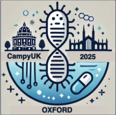Speakers
Keynote speakers

Title: Campylobacter and oxygen: A double-edged sword
Emeritus Professor of Microbial Physiology at the University of Sheffield
Dave Kelly earned his PhD from the University of Warwick in 1982, then progressed through roles as Lecturer, Senior Lecturer, Reader, and finally Professor from 1999 onwards. His research centres on the physiology, biochemistry, and molecular microbiology of Campylobacter jejuni, with particular focus on its atypical respiratory chains and energy conservation mechanisms. He has mentored numerous microbiologists and remains an active collaborator across institutions.

Impact of the Campylobacter glycome on intestinal persistence and disease
Professor and Associate Department Head | Department of Microbiology
Complex Carbohydrate Research Center University of Georgia
Christine Szymanski first began working with Campylobacter jejuni during her Ph.D. in the Department of Medical Microbiology and Immunology at the University of Alberta in Edmonton, Canada. She then joined the Enteric Disease Vaccine Program at the US Naval Medical Research Center in Silver Spring, Maryland for her postdoctoral studies prior to starting her own independent research career first at the National Research Council in Ottawa, Canada and then back at the University of Alberta.
It was in Edmonton where she formed her first company, VaxAlta Inc. with a focus on carbohydrate-based vaccines for livestock. Christine then joined the University of Georgia where she continues to: 1) characterise a wide range of bacterial glycoconjugate pathways, 2) exploit bacteriophage recognition proteins that bind these structures, and 3) understand the protective benefits of host milk oligosaccharides with a broader goal to develop novel therapeutics and vaccines for the prevention of diarrhoeal diseases and post-infectious neuropathies such as Guillain-Barré Syndrome.
She is a University of Georgia Distinguished Research Professor, fellow of the American Academy of Microbiology and Senior Member of the National Academy of Inventors.
Invited Speakers

Title: Campylobacter - Wild types, mutants and screens - from basic to applied biology
Senior Lecturer in Bacterial Pathogenesis at the University of Cambridge and Director of Studies in Veterinary Sciences at Jesus College.
Andrew is an Associate Professor in Microbial Pathogenesis in the Department of Veterinary Medicine, University of Cambridge. Andrew obtained his BSc degree in Biochemistry and Pharmacology and a PhD in Molecular Microbiology at Southampton University and then moved to the University of Cambridge to a postdoctoral position to develop transposon mutagenesis for Campylobacter.
After a series of post-doctoral positions, studying Campylobacter and Salmonella, he moved into his current position where his group uses genomic and functional genomic approaches, combined with advanced molecular, proteomic and imaging techniques, to determine the basis by which bacterial pathogens survive in different environments, colonise their hosts and cause disease.
Andrew is also involved in BBSRC-funded research at the Quadram Institute on the survival of Campylobacter in the food chain. T hrough the different research themes the aim is to translate the findings into novel intervention strategies, including small-molecule therapeutics, antibodies, antimicrobial peptides and vaccines.
University of Cambridge | Jesus College, Cambridge | ORCiD | Scholar

Title: Modelling Approaches for Source Attribution of Human Campylobacteriosis
Tine Hald, National Food Institute, Technical University of Denmark
Tine holds a PhD degree in veterinary epidemiology and a professorship in translational epidemiology. Work is focused on development of mathematical models for explaining the trends and sources and assessing the burden of zoonoses and foodborne diseases including antimicrobial resistant bacteria.
Tine has been pioneering the international development and application of methods for source attribution of foodborne diseases. Tine is teaching courses in risk assessment, epidemiology, and One Health, and is supervising postdocs, PhD, Master and Bachelor students. A main responsibility is to give scientifically-based advice to veterinary and food authorities, farmers’ and consumers organisations, and international organisations.

John Rodgers is the lead for Field Epidemiology and Surveillance workgroup within the Department of Bacteriology at the Animal and Plant Health Agency (APHA). John also leads for the UK National Reference Laboratory for Campylobacter in animals. Interests include the epidemiology and ecology of Campylobacter in food-producing animals, in particular poultry. National monitoring of antimicrobial resistance in Campylobacter and Enterococci and surveillance and research in foodborne bacterial zoonoses is carried out.

Title: Persistent Campylobacter Infections and Early Growth faltering in LMICs
Associate Professor at Universidad Peruana Cayetano Heredia | Visiting Scholar at the University of Virginia
Francesca Schiaffino is a veterinarian and Associate Professor at Universidad Peruana Cayetano Heredia (Lima, Peru) and a Visiting Scholar at the University of Virginia (Charlottesville, USA). She holds a PhD in Global Disease Epidemiology and Control from the Johns Hopkins Bloomberg School of Public Health, where she began investigating the genomic epidemiology of campylobacteriosis in the Peruvian Amazon.
Her research focuses on characterising persistent Campylobacter infections in undernourished children, identifying genomic factors associated with more severe disease episodes, and genomically comparing Campylobacter strains from household-reared versus industrially raised poultry in the hyperendemic setting of the Peruvian Amazon of Peru.

Taming Campylobacter: From Molecular Insights to Real-World Interventions
Lecturer of Microbiology at the University of Reading in the School of Biological Sciences
Aidan’s research focusses on the molecular physiology of Campylobacter jejuni, with a particular interest in nutrient acquisition and regulation. Research specialities include continuous culture and comparative transcriptomics. Aidan is a frequent collaborator with the Oxford groups, harnessing the cross-disciplinary approach of bioinformatics and wet lab work to achieve transformative outcomes. Aidan is a recent recipient of the Academy of Medical Sciences Springboard award, in collaboration with the Grant group at Cambridge, and is the Admissions Tutor for Microbiology programs at Reading.
Aidan Taylor | University of Reading | Scholar | ORCiD

Dr Anthony Wilson jointly leads the microbiological risk assessment team at the UK Food Standards Agency, the non-ministerial department with responsibility for food safety in England, Wales and NI.
He holds a doctorate in the epidemiology of infectious diseases from the University of Oxford and led a research group at the Pirbright Institute in Surrey prior to joining the Food Standards Agency.



